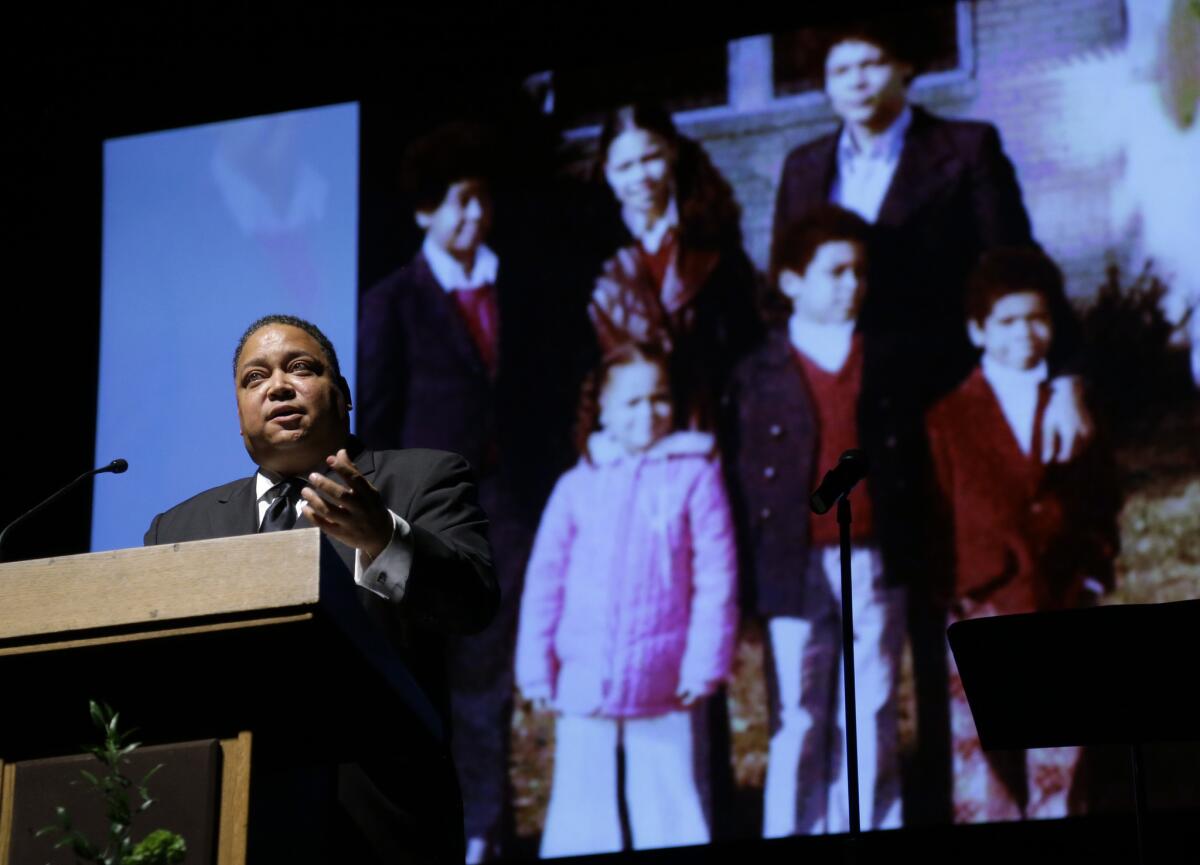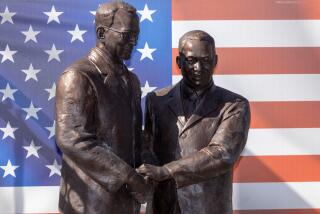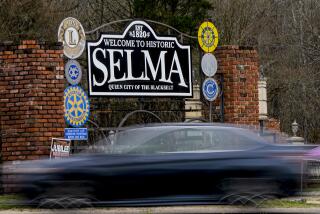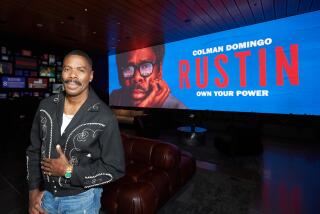Civil rights icon Julian Bond remembered for commitment to social justice

Michael Bond speaks about his father, Julian Bond, during a memorial service for the late civil rights leader Tuesday in Washington.
Fellow members of the civil rights community and former colleagues who filled Washington’s historic Lincoln Theatre on Tuesday honored late civil rights icon Julian Bond for his commitment to social justice and to his family and his work exposing younger generations to the movement.
“He was more like Dr. [Martin Luther] King in the sense that he’s a spokesperson more than a freedom fighter,” said historian Taylor Branch in an interview. “He’d be the first person to admit he didn’t enjoy jail. But he was a synthesizer and he had a gift for how to turn a phrase and a gift for how to lift things forward.”
In 1960, Bond helped found the Student Nonviolent Coordinating Committee, a leading group in the civil rights movement, and led protests against segregation at public facilities. Bond was elected to the Georgia House of Representatives at age 26 in 1965. But white members who dominated the Legislature blocked him from taking his seat on the grounds of his outspoken opposition to the Vietnam War.
The following year, the U.S. Supreme Court ruled he could take his seat, and he served in the House and then the state Senate until 1987. He lost a bid for Congress to fellow civil rights activist, John Lewis, in 1986.
In the 1970s, he helped found the Southern Poverty Law Center and was elected chairman of the National Assn. for the Advancement of Colored People in 1998.
“Some of you may remember that whenever Julian was asked, whether by friend or stranger, how he was, he would always say, ‘Almost perfect,” said Bond’s widow, Pam Horowitz. “And to me he was almost perfect.”
The 1,200 members of the diverse crowd that packed the theater arrived an hour before the memorial began and stood in a line that wrapped around the building, which once served black audiences during the Jim Crow era. In addition to Branch, speakers included Bond’s relatives; activists who fought alongside him; former NAACP Chairwoman Myrlie Evers-Williams and Morris Dees, cofounder of the Southern Poverty Law Center, which organized the private event.
Singers from the Choral Arts Society of Washington and Freedom Singers sang some of Bond’s favorite songs during what was a joyous and celebratory remembrance.
His son Michael Bond recalled a father who was so busy that some of his children thought he lived at an airport. Sometimes they had to schedule an appointment at the Georgia Capitol building to get their allowance, he said. But the moments the family were together, he recalled, were filled with joy.
“He was a great father,” said Bond.
Bond was born on Jan. 14, 1940, in Nashville and was raised in a middle class family. His parents, Horace Mann Bond and the former Julia Washington, were both academics. Historian W.E.B. DuBois, sociologist E. Franklin Frazier and singer Paul Robeson were among guests at his family’s home.
“It was in many ways a wonderful life, because it was so thick with intellectual activity, and you’re surrounded by these real giants of the black intelligentsia of noble, noble figures,” Bond told a Stanford University audience in 2008.
After Bond lost his bid for Congress, he spent his life on the speaking circuit and taught at a number of universities, most recently at the University of Virginia.
“Above all, he taught his students that the kind of politics that brought us war, joblessness and homelessness was ‘not the kind of politics they must play,’” said Deborah McDowell, a University of Virginia professor.
Evers-Williams remembered the last time she saw Bond, at a 2014 event to celebrate the opening of the film “Selma.”
“I remember thinking, how wise he is,” she recalled. “Sitting there quietly, taking in the crowd, smiling at those younger ones who seemed in awe to be in his presence, there was a certain gentle strength in his voice. One that commanded attention and respect, but without being loud and boisterous.”
Following his death on Aug. 15, Bond’s remains were cremated and his ashes placed in the Gulf of Mexico in a private family ceremony.
In addition to his widow, Bond is survived by his five children, a sister and brother and eight grandchildren, who were in attendance at the Washington event.
More to Read
Start your day right
Sign up for Essential California for news, features and recommendations from the L.A. Times and beyond in your inbox six days a week.
You may occasionally receive promotional content from the Los Angeles Times.






